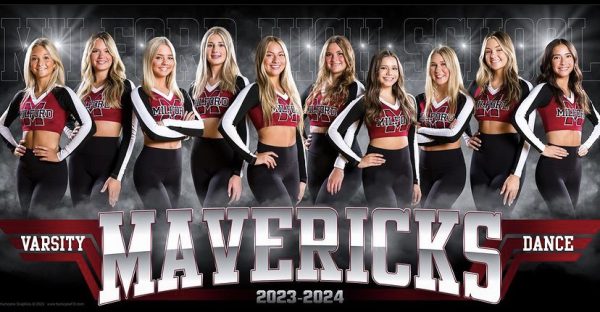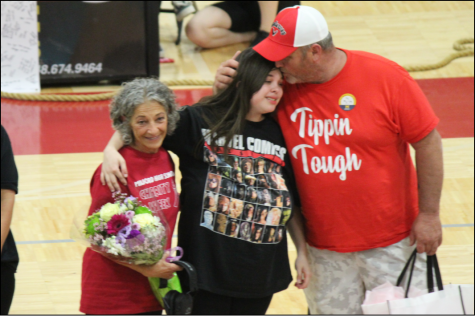Can you separate the art from the human being?
March 14, 2018
As American activist Maggie Kuhn once said, “speak the truth, even if your voice shakes.”
While movements like #MeToo and #TimesUp spread and sexual misconducts are uncovered, we live in a cultural state where it’s encouraged to speak up. Whether it’s victims testifying in court or sharing their stories through social media, conversations are a necessity.
With every victim speaking up, there’s a monster behind their distress, but what happens when the monster is a man who’s a powerful icon in the public’s eye? Is it possible to separate the art being created from the abusers involved?
Fan favorite actors and producers have been accused of misusing their power, and their victims are revealing the horrors of the entertainment industry.
In October 2017, The New York Times and the New Yorker followed two investigative stories that accused American film producer Harvey Weinstein of years of sexual harassment. Since then, more than 80 women have accused Weinstein of sexual misconduct. As a result, Weinstein was released from his own film studio and expelled from the Academy of Motion Picture Arts and Sciences.
Weinstein was accused of sexually abusing highly regarded actresses such as Gwyneth Paltrow, Uma Thurman, and Angelina Jolie for over 20 years; however, he has denied all accusations. Subsequently, as Weinstein’s decades of abuse were brought into light, the #MeToo movement became popular.
#MeToo was used on social media to demonstrate the prevalence of sexual assault and to encourage individuals to speak out against their abusers. The hashtag was created in 2006 by MySpace user Tarana Burke, but it recently gained popularity after actress Alyssa Milano urged others to spread the hashtag as Weinstein allegations became public.
This sparked a global trend of what some call the “Weinstein Effect.” The Weinstein Effect started a tidal wave of accusations involving famous men and their sexual abuse. Movements like #MeToo and #TimesUp have been an outlet for women to share their stories and let others know they’re not alone.
Men with fame and wealth using their power to take advantage of women ultimately comes from the inequality of women and men in the entertainment industry.
According to a study from the University of Southern California, only 4 percent of directors were female between 2007 and 2016, and 80 percent of those females only made one film. In an article she wrote for the New York Times, actress Salma Hayek also pointed out that 27 percent of words spoken in 2016’s biggest movies were from women; this inequality led to the suppression of women’s voices and stories.
Hayek also stated that with those statistics, “our voices are not welcome.” At the end of her article, Hayek expressed one horrendous reality: “Until there is equality in our industry, with men and women having the same value in every aspect of it, our community will continue to be a fertile ground for predators.”
With that comes the question of what should we do with a fertile ground for predators? Is the answer to immediately boycott all films with abusers, even ones that were once your favorites? Or is it possible to ignore the horrible, unjustifiable acts committed by these men to appreciate the good they once produced?
What Weinstein did to countless women was sickening, but should that immediately disregard the notable films he’s produced like Pulp Fiction, Shakespeare in Love, or his other 329 film and television productions?
As more women share their stories, more men are exposed for their heinous acts. James Franco was recently outed after he collected a Golden Globe Award for his most recent film, The Disaster Artist.
The Disaster Artist received a plethora of good reviews including a 91% on Rotten Tomatoes. However, as he collected his trophy, attention was brought to his “Time’s Up” pin on his suit.
Franco seemed to be a hypocrite to some for wearing a pin to show his support for women speaking up about their experiences. After the Golden Globes, one of Franco’s former acting students shared her own sexual abuse experience and accused Franco of exploiting her and using his power as abuse. Subsequently, four more former students revealed to the Los Angeles Times that Franco had abused them as well.
After the career that Franco has had between starring, producing, and directing a mirage of spectacular films, receiving an Ivy-League PhD in English from Yale University, and teaching film classes, it is unquestionable that he has accomplished a great deal in his 39 years.
Despite the great responses to The Disaster Artist, the film wasn’t nominated for an Oscar after Franco’s sexual misconduct accusations. Should Franco and his film been awarded for the artistic aspect of it, or was it the right thing to not reward a man who used his authority to violate younger females?
As Salma Hayek pointed out, the industry’s inequality served as a platform for male predators. While certainly a more equal industry would lead to women feeling like their voices were heard and valued, but there are still TV shows and movies created by these abusers.
While it’s easy for one to say that she or he can boycott all movies that feature actors, producers, or directors with a history of sexual assault, that seems quite unlikely and irrelevant in making a difference. Yet at the same time, while one may choose to “separate the art from the artist,” she or he should still be conscious about the crimes that some of the men have committed.
While, yes, it is incredibly important to bring attention to sexual misconduct happening, movies and TV shows shouldn’t be automatically discredited because it had someone terrible starring in it or producing it. The attention should be split between condemning the appalling men and praising the good performances that still came out from others involved.
The Disaster Artist should have been rewarded for the good, including other actors and actresses involved who weren’t associated with Franco’s sexual harassments, while also condemning Franco’s actions.
Notable figures like George Washington and Dr. Martin Luther King Jr. had dark sides beyond their acclaimed accomplishments. While Washington as a slave owner or MLK Jr. as a plagiarist is unacceptable, it doesn’t dismiss all the good they produced. This isn’t to say that we should brush aside all the horrible wrongdoings that prominent individuals have done; instead, we must make sure we denounce the horrible acts themselves and don’t resort to boycotting entire films that feature other innocent individuals.
With the growing courage from women and the outpouring support from the public, authoritative men in the entertainment industry will no longer be able to use their power for their own foul good. The solution to stopping the monstrous men in Hollywood is to create a system with equality between men and women.
Now that voices are being heard and this behavior can no longer be ignored, equity in the entertainment industry is a necessity. It’s not just up to the actresses anymore; audiences must demand for no more abuse of power.
Although most of the attention has revolved around the men involved in the sexual acts, it’s important to emphasize that exposure of sexual harassment all started with a few brave women using their voices. Without a small number of women standing up to the abuse, the tidal wave of voices wouldn’t have crashed into the world.
As long as women are still being treated unfairly, there will still be passion that fuels a fight for equality, justice, and an end to silence.








